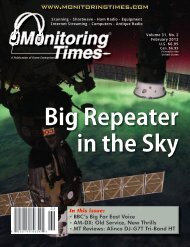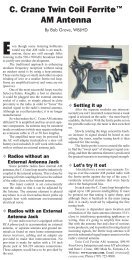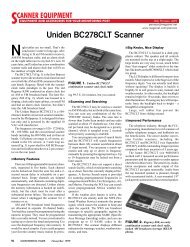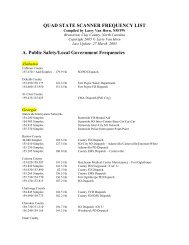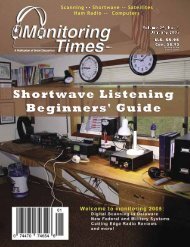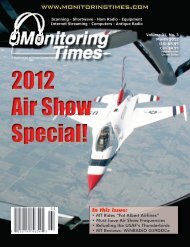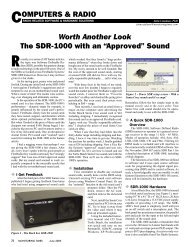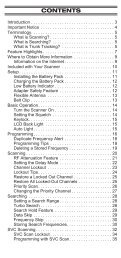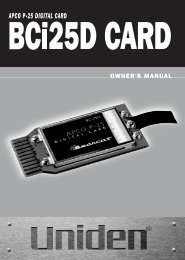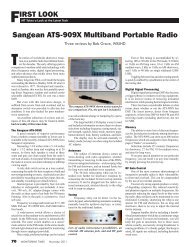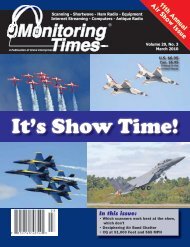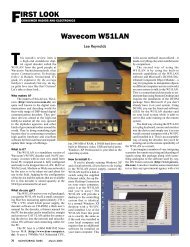RIGHT-click here - Monitoring Times
RIGHT-click here - Monitoring Times
RIGHT-click here - Monitoring Times
Create successful ePaper yourself
Turn your PDF publications into a flip-book with our unique Google optimized e-Paper software.
equires significant planning and organization,<br />
t<strong>here</strong> are a few places you can turn to for help.<br />
Groups anyw<strong>here</strong> in the country can consult the<br />
Prometheus Radio Project website, which offers<br />
information on the numerous steps required to<br />
start a station as well as interactive webinars at<br />
http://prometheusradio.org/webinars.<br />
Prometheus has a particular focus on<br />
supporting stations with a strong community<br />
engagement or social justice ethos, and groups<br />
that fit this description are eligible for more<br />
hands-on help from Prometheus staff and<br />
volunteers. If you’re a prospective community<br />
station located near the Pacific Northwest, an<br />
organization named Common Frequency may<br />
be able to provide cheap or even free help with<br />
navigating FCC bureaucracy and other legal<br />
issues that arise during the application process.<br />
For assistance with handling the regulatory<br />
and legal challenges in starting a community radio<br />
station, many law firms and Certified Public<br />
Accountants do pro-bono work for non-profits.<br />
Find a list of state-by-state resources at http://<br />
prometheusradio.org/state-legal-supportnon-profit-organizations.<br />
For help with the technical side of radio,<br />
broadcast engineers can not only perform frequency<br />
searches, but can also help with choosing<br />
and setting up equipment. Those on a tight<br />
budget should also look for a local non-profit<br />
resource center, which can offer information on<br />
available funding for non-profits in your area,<br />
and local community foundations, which may<br />
be interested in funding your project in order to<br />
support civic engagements, arts, or community<br />
development.<br />
WQRZ-LP FM post-Katrina 2005. This LPFM station was somehow able to serve its community<br />
in the aftermath of the hurricane. (Courtesy: WQRZ-LP)<br />
It is important to take advantage of any help<br />
you can find, because starting a community radio<br />
station is no simple task. Successful applicants<br />
must be resourceful and well-organized to meet<br />
eligibility requirements and raise the funds to<br />
build a station. But the most crucial part of<br />
starting an LPFM is forming a mission that can<br />
inspire a community to join in the effort. With<br />
the help of a committed group of supporters,<br />
your community radio station can become not<br />
only a possibility, but a powerful reality.<br />
Brad Gibson is a Community Radio Organizer<br />
at the Prometheus Radio Project. His job<br />
includes managing relationships with representatives<br />
from radio stations, non-profit organizations,<br />
and community groups, as well as providing<br />
support for LPFM station hopefuls.<br />
August 2012 MONITORING TIMES 19



